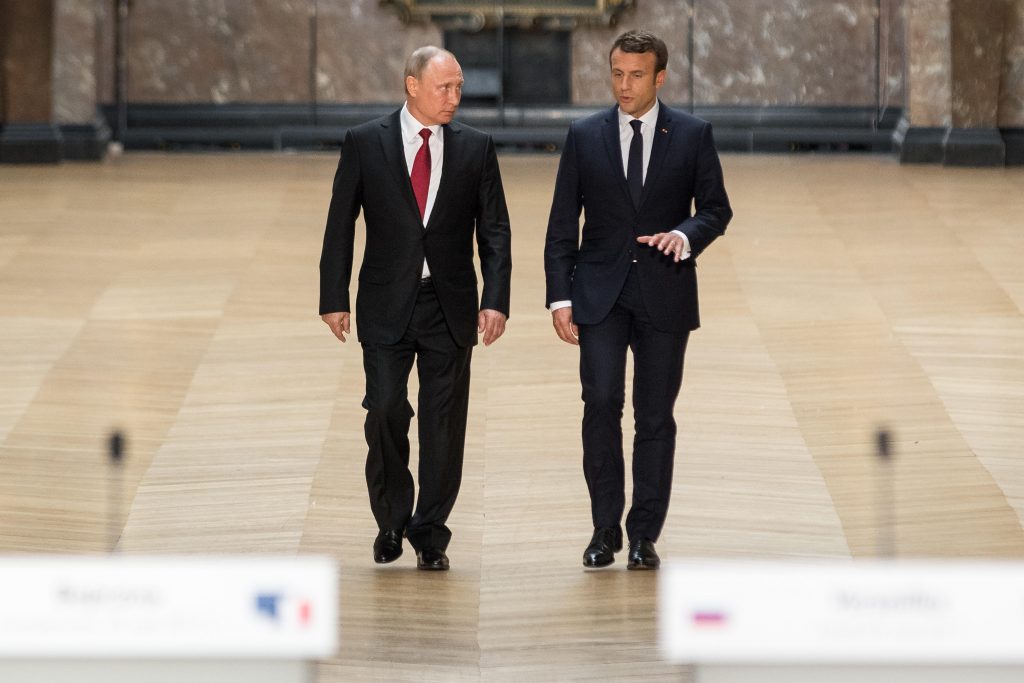Western diplomacy aimed at reducing tension over Moscow’s military buildup on Ukraine’s border shifted into high gear, with French President Emmanuel Macron, determined to head European peace efforts, pledging to achieve a peaceful resolution in Kremlin talks with Vladimir Putin.
Macron has spoken to Putin five times since December – he was flying on later for talks in Kyiv. The Kremlin leader described some of Macron’s ideas for tackling the crisis as “feasible”.
German Chancellor Olaf Sholz held his first meeting with U.S. President Joe Biden in the White House and both leaders proclaimed unity in formulating responses should Russia proceed with any sort of military incursion into Ukraine. Biden repeated warnings of tough sanctions, including a halt to Nord Stream 2, the lucrative pipeline due to take Russian gas to Germany.
The latest assessments from U.S. and Ukrainian analysts say more than 100,000 Russian troops are deployed on the Ukrainian border. A U.S. estimate at the weekend said Moscow was “70 percent prepared” for an incursion but offered no specific details. Some of the 3,000 U.S. troops Biden has pledged to send to Eastern Europe began arriving this week in Poland.
Russia says it has no intention of invading its neighbour – eight years after annexing Ukraine’s Crimean Peninsula and fomenting separatist unrest in eastern Ukraine’s Donbas region. It has instead demanded the West provide “security guarantees” including an undertaking that NATO will make no further eastward expansion and Ukraine will never be allowed to join.
The United States and NATO have rejected those notions outright in a series of meetings in various European capitals in recent weeks but have proposed further talks on disarmament issues and measures surrounding military exercises.
France promotes “Normandy” format for talks with Kremlin
Macron has championed a return to the “Normandy Format” — a grouping of France, Germany, Ukraine and Russia — as the primary means for end eight years of conflict in eastern Ukraine in which 14,000 have died.
Speaking before his meeting with the Kremlin leader, which went on for five hours, considerably longer than planned, Macron told reporters before the meeting that a “Finlandisation” of Ukraine was one of the options under consideration.
Finlandisation was a Cold War-era term describing Finland’s position of maintaining its independence as a democracy while adhering to strict neutrality in its international relations – in Ukraine’s case it would mean staying out of NATO and limiting its foreign policy options.
Macron has not previously used the term, often viewed in the West as pejorative.
Putin told reporters after the meeting that he saw some merit in Macron’s proposals.
“A number of his ideas or proposals — which it is probably too early to speak about — I see as rather feasible for creating a foundation for our further steps,” he said.
But the Kremlin leader spoke with typical derision of Ukrainian President Volodymyr Zelensky, saying that Ukrainian membership for Ukraine would only embolden Kyiv to launch a military offensive to recapture Crimea.
Macron, who has called for Europe to engage in its own diplomacy, said the next few days would be “decisive” and “require intensive discussions which we will pursue together”.
Before his arrival in Moscow, the French president told the weekly Journal du Dimanche that Russia’s relationship with the West was the focal point of the crisis rather than Ukraine.
“The geopolitical objective of Russia today is clearly not Ukraine, but to clarify the rules of cohabitation with NATO and the EU,” he told the weekly.
Stopping Nord Stream 2
In Washington, Biden was forthright in pledging firm action if Russia staged an incursion – and that meant halting Nord Stream 2, awaiting regulatory approval before greatly expanding Russian gas flows to Germany.
“If Russia invades, that means tanks and troops crossing the border of Ukraine again, then there will be no longer a Nord Stream 2,” Biden said. “We will bring an end to it.”
Sholz repeated his stand that Germany and the United States stood united, but was less emphatic in terms of measures that might be taken against the pipeline. And Biden, while promising to stop the project, gave few details on how that might happen.
Sholz has come under criticism from some Western politicians – and some within Germany – for a more reticent stand on action to be undertaken against Russia. Unlike Britain and the United States, Germany has sent no new lethal weaponry to Ukraine and has acted to stop shipments from other countries from crossing its territory.
Sholz is due to visit both Russia and Ukraine in the coming days.
Ukrainian President Zelensky came to power in 2019 on pledges of clinching a deal with the Kremlin to end hostilities in eastern Ukraine and restore lost territory, but has in the past year said only NATO membership can solve the country’s problems.
Putin has disdainfully refused to discuss the conflict with Zelensky, describing it as a “civil war” to be addressed by the Ukrainian president dealing directly with separatist leaders. The Kremlin leader has clearly preferring to deal directly with Washington – and has held two video summits with Biden since early December.
Ukrainian Foreign Minister Dmytro Kuleba on Monday restated what he described as a “red line” for Kyiv’s- a refusal to deal with the leaders of two unrecognised separatist statelets in Donbas.
Zelensky has in recent weeks urged his own people to remain calm and Western leaders to tone down talk of an impending invasion, saying it was causing unnecessary tension and hurting his country’s economy.

